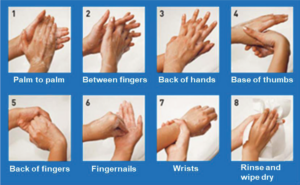What is GRE/VRE?
GRE stands for Glycopeptide resistant enterococci.
GRE are sometimes referred to as VRE which stands for vancomycin resistant enterococci.
Glycopeptide resistant enterococci are resistant to glycopeptide antibiotics e.g. Vancomycin and Teicoplanin.
Enteroccoci are bacteria that are commonly found in the bowels of most humans where they make up part of the normal bacterial flora.
Most people who carry enterococci do not suffer any ill effects. Carrying enterococci harmlessly like this is called ‘colonisation’.
Are some people more at risk than others?
GRE/VRE infections can occur in hospital patients, particularly those who are more susceptible to infection. Other risk factors include antibiotic treatment and prolonged stay in hospital.
How is GRE/VRE spread?
There are two main ways to contract GRE/VRE infections.
The first is from GRE/VRE which live harmlessly in a person’s bowel and are transferred to other areas of the body e.g. wounds.
The second is directly from person to person on the hands or indirectly from contaminated equipment that has not been cleaned properly.
What illnesses do GRE/VRE cause?
GRE/VRE may cause wound infections and blood poisoning. Occasionally it can cause infections of the urinary tract or bile duct.
Is the GRE/VRE infection treatable?
GRE/VRE are not particularly harmful bacteria but they are more difficult to treat, this is due to the limitation in the range of effective antibiotics available.
What happens when a patient is found to have a GRE/VRE infection?
Patients diagnosed with this infection will be transferred to a single room to minimise the risk of spread of the bacteria to other patients on the ward.
Patients experiencing symptoms of diarrhoea cause a greater risk of spread of the infection.
People in hospital are more vulnerable to the risk of infection because of illness, surgery and invasive devices such e.g. Urinary catheters and drips.
Healthcare workers will take precautions when dealing with a patient with GRE/VRE by using protective clothing such as aprons, gloves and hand hygiene to prevent the spread to other patients.
What about visitors?
Your family and friends may still visit but they must clean their hands before and after visiting. The alcohol hand rub provided will be sufficient although if they prefer, they may wash their hands with soap and water. Your visitors will be advised about appropriate Personal Protective Equipment (PPE) by ward staff.
Please do not let your visitors sit or lie on your bed. If your visitors are visiting other patients in the hospital it is advisable that they visit them before visiting you.
How long do patients with GRE/VRE have to remain in a single?
Patients with GRE/VRE will be nursed in a single room throughout the period of admission.
When can I go home?
You will be allowed home when your general condition has cleared. This may vary from patient to patient and may actually be before your infection is totally cleared, however this should not be a risk to your family or friends.
Normal personal hygiene i.e. Bath/shower is sufficient as is normal household cleaning. Clothes should be laundered as usual.
Hand hygiene
The role of hand hygiene can help us prevent the spread of infection.
How to wash your hands effectively with soap and water:
- Wet hands thoroughly before applying soap.
- Vigorously rub all surfaces of both hands with soap lather.
- Pay special attention to the finger tips, thumbs and between fingers (these areas are frequently missed when washing hands).
- Rinse off all the soap under running water and dry hands thoroughly.
- Always cover cuts with waterproof plasters.
- When you can, apply hand cream as this helps to prevent dryness and chapping.

Where can I get more information?
If you would like further information please speak to a member of your care staff, who may also contact the Infection Prevention and Control Team for you.
The UK Health Security Agency (UKHSA) website is another source of information:
https://www.gov.uk/government/organisations/uk-healthsecurity-agency
Infection Prevention and Control contact details
You can contact the team Monday – Friday between 9am – 5pm on the following numbers:
Bedford
01234 795848
Luton
01582 497321
